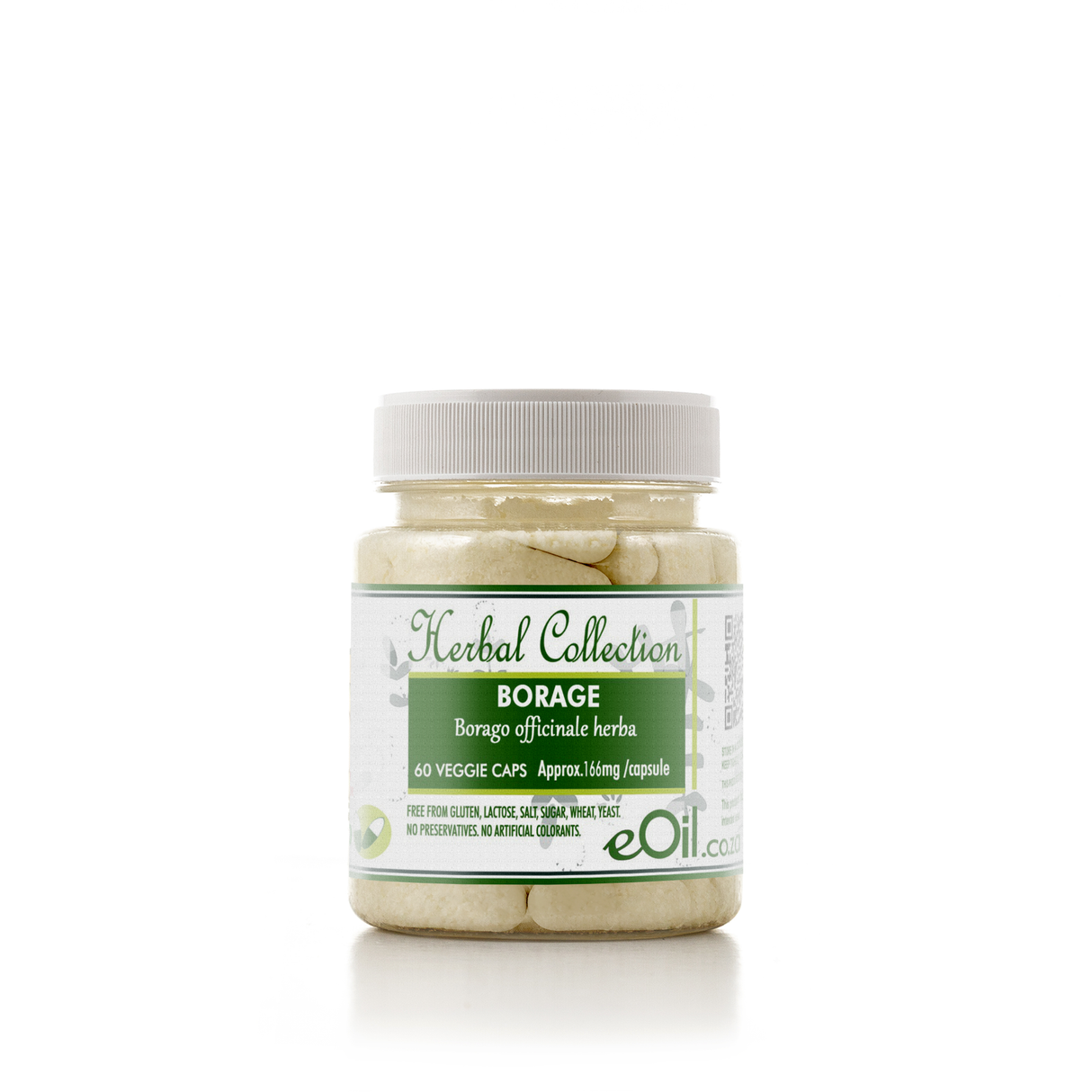Borage Herb - 60 Vegan capsules - Herbal Collection
Borage Herb - 60 Vegan capsules - Herbal Collection is backordered and will ship as soon as it is back in stock.
Description
Description
In traditional herbalism, Borage herb is used as a restorative tonic for the adrenal glands. It is the "go-to" herb for rebuilding strength after a long illness, combating deep exhaustion, and lifting the spirits during times of grief or stress.
Key Benefits & Uses:
Adrenal Support & Burnout: This is its #1 traditional use. It is known as a restorative tonic for "worn out" systems. It is used to help the body recover from the effects of chronic stress, fatigue, and overwork (adrenal exhaustion).
"The Herb of Courage" (Mood): Historically, it was added to wine to "gladden the heart." Today, it is used to help alleviate feelings of heaviness, grief, and mild depression, promoting a sense of well-being.
Respiratory Support: Borage herb is rich in mucilage. It acts as a soothing expectorant and demulcent, traditionally used to soothe dry coughs, sore throats, and chest congestion during a cold or flu.
Fevers: It has a "sudorific" action (induces sweating), which is traditionally used to help break a fever naturally.
Important Cautions:
Short-Term Use Only: Due to the presence of naturally occurring alkaloids (PAs) in the raw herb, this supplement is intended for short-term restorative use, not long-term daily maintenance.
Do NOT use if pregnant or breastfeeding.
Consult a healthcare professional if you have liver concerns.
TRADITIONALLY USED FOR
Borage (Borago officinalis), also known as starflower, is a versatile herb native to the Mediterranean region.
It has been used traditionally for its culinary, medicinal, and ornamental properties.
Borage is rich in essential nutrients, such as vitamins, minerals, and essential fatty acids, and has a variety of benefits and uses:
- Anti-inflammatory properties: Borage contains gamma-linolenic acid (GLA), an omega-6 fatty acid that has been shown to possess anti-inflammatory properties. It can help alleviate symptoms of various inflammatory conditions, such as rheumatoid arthritis, eczema, and asthma.
- Respiratory health: Borage has been traditionally used to treat respiratory ailments, such as coughs, colds, and bronchitis. The mucilage in borage can help soothe irritated mucous membranes and reduce inflammation in the respiratory tract.
- Skin health: Borage seed oil is often used in skincare products due to its high concentration of GLA, which can help improve skin elasticity, hydration, and overall appearance. It has also been used to alleviate symptoms of skin disorders like eczema and psoriasis.
- Stress and anxiety relief: Borage has been traditionally used as a mild sedative and natural remedy for stress and anxiety. The herb contains compounds like rosmarinic acid, which may help to reduce anxiety and promote relaxation.
- Cardiovascular health: Some studies have suggested that borage oil may help to lower blood pressure and reduce the risk of heart disease due to its anti-inflammatory properties and high concentration of GLA.
- Digestive health: Borage has been used traditionally to treat digestive issues such as indigestion, constipation, and gastritis. Its anti-inflammatory properties can help soothe the digestive tract and promote overall gut health.
- Diuretic properties: Borage has mild diuretic properties, which can help to reduce water retention and alleviate symptoms of edema or swollen joints.
- Women's health: Borage has been used traditionally to help alleviate symptoms of premenstrual syndrome (PMS) and menopause, such as mood swings, irritability, and hot flashes, due to its hormone-balancing properties.
In addition to its health uses, borage is often grown as an ornamental plant and used in culinary applications.
Its leaves can be added to salads or cooked like spinach, and its vibrant blue flowers are edible and often used as a garnish.
Please note that it's essential to consult a healthcare professional before using borage or any other herbal supplement, especially if you are pregnant, breastfeeding, or have a pre-existing medical condition.
INFORMATION
Source : http://www.wikiphyto.org/wiki/Bourrache
Reference on http://www.wikiphyto.org
Translation in English by Google Translate (go to the page of the source linked | on Chrome cellphones go on the 3 dots on the top right and select translate in your preferred language | on laptop right click your mouse and select option translate when hoovering on the page
plant name
Borage, beef tongue
International Latin denomination
botanical family
Boraginaceae
Description and habitat
- Herb to 50 cm tall, with rough, prickly hairs all over its surface, branching hollow stems, rough oval leaves, flowers with sharp, blue petals surrounding a conical bundle of black anthers Seeds contained in dehiscent tetrakenes but the seed yield is random (unsynchronized flowering)
History and tradition
- Officinale by its flowers and flowering tops but beware of pyrrolizidine alkaloids
- Cultivated for the production of its oil-rich seeds
Parts used
- Seeds, flowers and flowering tops
Dosage forms available
- Borago officinalis mother tincture whole plant
Usual dosages
Composition
Main components of the plant
- Mucilages , allantoin , flavonols and potassium salts
- Pyrrolizidine alkaloids : lycopsamine , amabiline , supinine
- Anthocyanins in flowers
- Oil of variable yield 13 to 33% with polyunsaturated fatty acids:
- Omega-6:
- Linoleic acid (30 - 40%) gamma-linolenic acid (20 - 40% depending on origin)
- Others :
- Oleic acid (15 - 19%)
- Palmitic acid (10%-11%), stearic acid (3.5%-4.5%), eicosanoic acid (3.5%-5.5%), erucic acid (1.5%-3.5%)
- Omega-6:
Main components of buds or young shoots
Main components of essential oil
Properties
Plant properties
- Antitussive, expectorant, emollient (mucilage), diaphoretic
- Laxative (mucilage)
- Healing ( allantoin ) externally
- Diuretic ( flavonols and potassium salts)
- Anti-oxidant (de-oiled seeds) [1]
- Oil rich in gamma-linolenic acid [2] omega-6, hypocholesterolemic, anti-platelet aggregation
- Nutritional supplementation with omega-6 essential fatty acids (omega-6 EFAs) is of potential interest in the treatment of atopic dermatitis (the hypothesis being that patients with atopic dermatitis have reduced activity of the enzyme delta-6 -desaturase), and borage oil would be more interesting than evening primrose oil because it contains two to three times more gamma-linolenic acid [3]
Bud properties
Properties of essential oil
Directions
Indications of the whole plant (phytotherapy)
- The plant itself is unusable due to its hepato- and nephrotoxic pyrrolizidine alkaloids
- The flowers are sometimes eaten to decorate salads, they would be reassuring
- The seed oil is used in various ailments such as multiple sclerosis, diabetes, cardiovascular diseases, eczema [4]
- Rheumatoid arthritis ( gamma-linolenic acid : 2.8 mg of GLA per day) [5]
Indications of the bud (gemmotherapy)
Specific indications of essential oil (aromatherapy)
Known or suspected mode of action
- Oil extracted by cold pressing
Usual formulations
- Herbal tea of 5 flowers of Jean Valnet:
- Lavender flowers ( Lavandula vera ) 20 grams
- Wild pansy flowers ( Viola tricolor ) 20 grams
- Marigold flowers ( Calendula officinalis ) 10 grams
- Broom flowers ( Cytisus scoparius or Sarothamnus scoparius ) 10 grams
- Borage flowers ( Borago officinalis ) 10 grams
- 1 pinch for a cup. Infusion of a few minutes, one cup two to three times a day, by discontinuous cures
Regulations
- French Pharmacopoeia list A (aerial part, flower)
Possible side effects and precautions for use
- Hepatotoxicity and mutagenicity of pyrrolizidine alkaloids
- No use of the plant per os (except flowers occasionally)
- The seed oil is harmless
Bibliographic references
- Aller↑ Mahinda Wettasinghe, Fereidoon Shahidi. Antioxidant and free radical-scavenging properties of ethanolic extracts of defatted borage (Borago officinalis L.) seeds. Food Chemistry, Volume 67, Issue 4, December 1999, Pages 399–414
- Aller↑ S Stymne, AK Stobart. Biosynthesis of gamma-linolenic acid in cotyledons and microsomal preparations of the developing seeds of common borage (Borago officinalis). Biochem J. 1986 December 1; 240(2): 385–393. [1]
- Aller↑ Foster RH, Hardy G, Alany RG. Borage oil in the treatment of atopic dermatitis. Nutrition. 2010 Jul-Aug;26(7-8):708-18. doi: 10.1016/j.nut.2009.10.014. PMID 20579590
- Aller↑ Asadi-Samani M, Bahmani M, Rafieian-Kopaei M. The chemical composition, botanical characteristic and biological activities of Borago officinalis: a review. Asian Pac J Too Med. 2014 Sep;7S1:S22-8. doi: 10.1016/S1995-7645(14)60199-1. PMID 25312125
- Aller↑ Zurier RB, Rossetti RG, Jacobson EW, DeMarco DM, Liu NY, Temming JE, White BM, Laposata M. Gamma-Linolenic acid treatment of rheumatoid arthritis. A randomized, placebo-controlled trial. Arthritis Rheum. 1996 Nov;39(11):1808-17. PMID 8912502
- Kathryn M. Larson, Mark R. Roby, Frank R. Stermitz. Unsaturated Pyrrolizidines from Borage (Borago officinalis), a Common Garden Herb. J.Nat. Prod., 1984, 47 (4), pp 747–748
- SPJN Senanayake, F. Shahidi. Chemical and Stability Characteristics of Structured Lipids from Borage (Borago officinalis L.) and Evening Primrose (Oenothera biennis L.) Oils. Journal of Food Science, Volume 67, Issue 6, pages 2038–2045, August 2002
CAUTION
Store in a cool, dry place, away from light. Keep tightly closed, away from the reach of Children and pets.
Do not exceed the daily dose.
This product is not intended to prevent or cure any form of illness or disease.
If you are pregnant or nursing ; If you have a medical condition or are in the course of medical treatment ; If you are programmed for theater/operation in the near future, please consult your healthcare practitioner before using this product.
This product cannot replace a varied and balanced diet and a healthy lifestyle.
This product has not been evaluated by the SAHPRA for its quality, safety or intended use.
For More Information please check our General Safety Herbal products Page

Borage Herb - 60 Vegan capsules - Herbal Collection is backordered and will ship as soon as it is back in stock.




